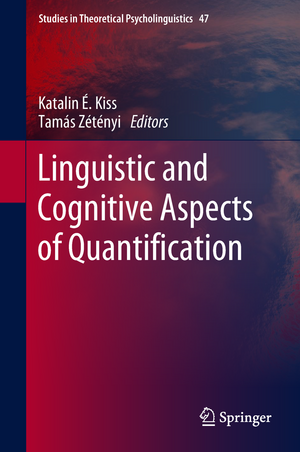Linguistic and Cognitive Aspects of Quantification: Studies in Theoretical Psycholinguistics, cartea 47
Editat de Katalin É. Kiss, Tamás Zétényien Limba Engleză Hardback – 13 aug 2018
| Toate formatele și edițiile | Preț | Express |
|---|---|---|
| Paperback (1) | 637.13 lei 6-8 săpt. | |
| Springer International Publishing – 25 dec 2018 | 637.13 lei 6-8 săpt. | |
| Hardback (1) | 892.90 lei 6-8 săpt. | |
| Springer International Publishing – 13 aug 2018 | 892.90 lei 6-8 săpt. |
Din seria Studies in Theoretical Psycholinguistics
- 18%
 Preț: 948.61 lei
Preț: 948.61 lei - 18%
 Preț: 1222.31 lei
Preț: 1222.31 lei - 15%
 Preț: 641.53 lei
Preț: 641.53 lei - 18%
 Preț: 947.50 lei
Preț: 947.50 lei - 15%
 Preț: 645.79 lei
Preț: 645.79 lei -
 Preț: 381.81 lei
Preț: 381.81 lei - 18%
 Preț: 2103.56 lei
Preț: 2103.56 lei -
 Preț: 383.83 lei
Preț: 383.83 lei - 15%
 Preț: 647.27 lei
Preț: 647.27 lei - 18%
 Preț: 951.77 lei
Preț: 951.77 lei - 15%
 Preț: 643.34 lei
Preț: 643.34 lei - 18%
 Preț: 948.61 lei
Preț: 948.61 lei - 20%
 Preț: 649.09 lei
Preț: 649.09 lei - 18%
 Preț: 956.99 lei
Preț: 956.99 lei -
 Preț: 381.98 lei
Preț: 381.98 lei - 15%
 Preț: 643.48 lei
Preț: 643.48 lei - 18%
 Preț: 952.72 lei
Preț: 952.72 lei - 15%
 Preț: 645.47 lei
Preț: 645.47 lei - 18%
 Preț: 1228.62 lei
Preț: 1228.62 lei - 15%
 Preț: 647.27 lei
Preț: 647.27 lei - 18%
 Preț: 945.47 lei
Preț: 945.47 lei - 18%
 Preț: 956.03 lei
Preț: 956.03 lei - 15%
 Preț: 642.03 lei
Preț: 642.03 lei -
 Preț: 391.61 lei
Preț: 391.61 lei - 20%
 Preț: 558.63 lei
Preț: 558.63 lei - 15%
 Preț: 639.73 lei
Preț: 639.73 lei - 18%
 Preț: 947.50 lei
Preț: 947.50 lei - 18%
 Preț: 958.25 lei
Preț: 958.25 lei
Preț: 892.90 lei
Preț vechi: 1088.90 lei
-18% Nou
Puncte Express: 1339
Preț estimativ în valută:
170.91€ • 185.71$ • 143.66£
170.91€ • 185.71$ • 143.66£
Carte tipărită la comandă
Livrare economică 21 aprilie-05 mai
Preluare comenzi: 021 569.72.76
Specificații
ISBN-13: 9783319915654
ISBN-10: 3319915657
Pagini: 220
Ilustrații: VIII, 219 p. 34 illus.
Dimensiuni: 155 x 235 mm
Greutate: 0.5 kg
Ediția:1st ed. 2018
Editura: Springer International Publishing
Colecția Springer
Seria Studies in Theoretical Psycholinguistics
Locul publicării:Cham, Switzerland
ISBN-10: 3319915657
Pagini: 220
Ilustrații: VIII, 219 p. 34 illus.
Dimensiuni: 155 x 235 mm
Greutate: 0.5 kg
Ediția:1st ed. 2018
Editura: Springer International Publishing
Colecția Springer
Seria Studies in Theoretical Psycholinguistics
Locul publicării:Cham, Switzerland
Cuprins
Introduction; Katalin É. Kiss.- Structural asymmetry in question/quantifier interactions; Asya Achimova, Viviane Déprez, and Julien Musolino.- Children know the prosody-semantic/pragmatic link: Experimental evidence from Rise-Fall-Rise and scope; Ayaka Sugawara, Martin Hackl, Irina Onoprienko, and Ken Wexler.- Differentiating universal quantification from perfectivity: Cantonese-speaking children’s command of the affixal quantifier saai3; Margaret Ka-yan Lei and Thomas Hun-tak Lee.- Scalar implicature or domain restriction: How children determine the domain of numerical quantifiers; Katalin É. Kiss and Tamás Zétényi.- Universal quantification and distributive marking in Serbian; Natasa Knezevic and Hamida Demirdache.- The distributive–collective ambiguity and Information Structure; Balázs Surányi and Levente Madarász.- Quantifier Spreading in school-age children: An eye-tracking study; Irina A. Sekerina, Patricia J. Brooks, Luca Campanelli, and Anna M.Schwartz.- Turning adults into children: Evidence for resource-based accounts of errors with universal quantification; Oliver Bott and Fabian Schlotterbeck.- Subject index.
Textul de pe ultima copertă
This volume presents the results of psycholinguistic research into various aspects of the grammar of quantification. The investigations involve children and adults, speakers of different languages, using a variety of experimental paradigms. A shared aspect of the studies is that they present their experimental results as evidence evaluating linguistic theories of quantification. Topics discussed include the interpretation of universal, comparative, and superlative quantifiers, quantifier spreading, scope interaction between pairs of quantifiers and between quantifiers and wh-phrases, distributivity and cumulativity, the interaction of quantifier interpretation with information structure, the disambiguating role of prosody, the functional overlap between universal quantification and perfectivity, and much more. The focus on experimental evidence makes this book essential reading for linguists (syntacticians, semanticists and pragmatists), psycholinguists and psychologists interested inquantification.
Caracteristici
Provides experimental evidence for various, often competing, linguistic theories of quantification Discusses the major research topics subjected to experimental study in the field of quantification Illustrates the different methodological tools applicable in the experimental study of quantification
